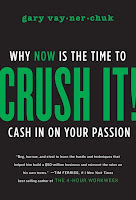 There’s nothing new that I can possibly blog about Malcolm Gladwell‘s The Tipping Point. It’s a book that’s back in the Amazon.ca top 100 today, I’m guessing because of all the Nook news, and it’s simply one of those titles that you imagine everyone to have already reviewed, if not read. So when I was browsing around the Vancouver Public Library sale last Thursday trying to ward off the persistent stomach butterflies (there because of the whole public speaking element to happen the next day; bleech), I was pleased to find a battered copy of The Tipping Point from the Kitsilano Branch for a whopping $0.55.
There’s nothing new that I can possibly blog about Malcolm Gladwell‘s The Tipping Point. It’s a book that’s back in the Amazon.ca top 100 today, I’m guessing because of all the Nook news, and it’s simply one of those titles that you imagine everyone to have already reviewed, if not read. So when I was browsing around the Vancouver Public Library sale last Thursday trying to ward off the persistent stomach butterflies (there because of the whole public speaking element to happen the next day; bleech), I was pleased to find a battered copy of The Tipping Point from the Kitsilano Branch for a whopping $0.55.
The central thesis of Gladwell’s book, that little “things” can lead to sweeping change, seemed particularly relevant reading for the days leading up to and passing by Book Camp. The iconic work looks at all of the social conditions that surround a product, event or action “tipping” into an epidemic. From smoking to book sales, the book comes to some pretty cool conclusions about the power of word of mouth. Words that we toss around all the time, like connectors and mavens, this theory of something “tipping” has become part of the everyday business lexicon. And it’s easy to see why.
 Gary Vaynerchuk’s Crush It! isn’t as intellectual nor as everlasting as The Tipping Point, but it’s a really good example of putting Malcolm Gladwell’s theories into action. Vaynerchuk grew his business exponentially by investing in his own personal brand, used the “free” tools of the internet to grow it, and then tipped over into the uber-successful range by simply working hard and “crushing it.” It’s a veritable how-to manual for his kind of success and a good handbook for anyone somewhat curious about social media.
Gary Vaynerchuk’s Crush It! isn’t as intellectual nor as everlasting as The Tipping Point, but it’s a really good example of putting Malcolm Gladwell’s theories into action. Vaynerchuk grew his business exponentially by investing in his own personal brand, used the “free” tools of the internet to grow it, and then tipped over into the uber-successful range by simply working hard and “crushing it.” It’s a veritable how-to manual for his kind of success and a good handbook for anyone somewhat curious about social media.
I like how both books focus on finding/offering solutions instead of lamenting the demise of the “old” ways of doing business. Vaynerchuk’s work isn’t necessarily innovative; it’s stuff people have been doing on the internet for as long as the web’s been around. But what he managed to achieve goes above and beyond how everyday people use the tools, which is impressive. Also, he’s driven to succeed in ways that, yes I’m going to say it, regular people may not be — he’s a born Salesman, a picture perfect Connector, and proof positive that word of mouth absolutely works to drive community, which in turn drives sales, which in turn allowed his endeavours to tip into an epidemic.
The stickiness of Gladwell’s book versus Vaynerchuk’s can’t really be compared. I dogeared piles of pages of the former and returned my copy to work the morning after I read the latter. One’s a book that would benefit from repeated reads and the other I’d recommend as a handbook to anyone looking to build their brand through social media. All the way through The Tipping Point, I tried to define myself in terms of the different personalities Gladwell presented. All the way through Crush It!, I wondered how much coffee Vaynerchuk must drink in a day to get himself out there to the extent that he does — two very different intellectual exercises on my part.
Regardless, there were lessons from both books that I’d apply to my everyday and my work life.
1. That you need to pull the best, most relevant ideas from everything you read, fiction to non, and everything in between, and apply this learning to your life. Maybe it’s just in the sense that you enjoyed something and want to pass it on, but that your passion, about anything, can be contagious. And that’s not a bad thing.
2. Pay close attention to what goes on around you. You might not think you have anything in common with how “cool” becomes relevant, but within that, you’ll discover what’s authentic and what’s rubbish — especially in areas of your own expertise.
3. Don’t be afraid of people. Or situations. Or of doing things that might make you uncomfortable (read: running a seminar in front a large group of people). Ahem. YES, I realize how ironic this is coming from shy, scaredy-cat me.
4. Read more nonfiction.
5. Getting people excited about reading isn’t just about selling books. For me, it’s about the survival of our culture, whether it’s pop or otherwise, it’s a record of who we are as a people at the time. It’s necessary. It’s important. It’s valuable and it’s a part of our survival. Art matters. Fighting about it won’t get us to our goals any quicker.


